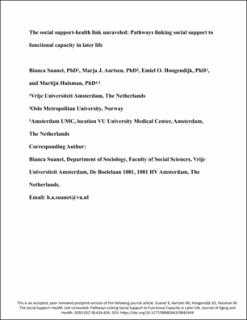| dc.contributor.author | Suanet, Bianca | |
| dc.contributor.author | Aartsen, Marja | |
| dc.contributor.author | Hoogendijk, Emiel | |
| dc.contributor.author | Huisman, Martijn | |
| dc.date.accessioned | 2021-01-21T12:29:48Z | |
| dc.date.accessioned | 2021-03-01T15:02:20Z | |
| dc.date.available | 2021-01-21T12:29:48Z | |
| dc.date.available | 2021-03-01T15:02:20Z | |
| dc.date.issued | 2019-04-15 | |
| dc.identifier.citation | Suanet B, Aartsen M, Hoogendijk E, Huisman M. The Social Support - Health Link Unraveled: Pathways Linking Social Support to Functional Capacity in Later Life. Journal of Aging and Health. 2019:1-22 | en |
| dc.identifier.issn | 0898-2643 | |
| dc.identifier.issn | 1552-6887 | |
| dc.identifier.uri | https://hdl.handle.net/10642/9791 | |
| dc.description.abstract | Objective: Despite evidence that social support is strongly related to health, very little is known about the mechanisms underlying this association. This study investigates whether physical activity, depressive symptoms, and chronic diseases mediate the associations between social support and functional capacity. Method: Data from the Longitudinal Aging Study Amsterdam on 954 participants, aged 75 and older, covering 9 years, are analyzed with latent growth mediation models. Results: Only the indirect path from the initial level of emotional support to the initial level of functional capacity through the initial level of depressive symptoms was significant. All mediators however were significantly associated with the level of and changes in functional capacity. Models with reversed pathways were estimated, but model fit was worse. Discussion: Because only initial levels of social support relate to functional capacity, and changes in social support do not, older adults likely receive the support they need. | en |
| dc.description.sponsorship | The authors disclosed receipt of the following financial support for the research, authorship, and/or publication of this article: The data collection was supported by the Netherlands Ministry of Health, Welfare and Sport, Directorate of Long-Term Care; and the Netherlands Organization for Scientific Research (NWO, Grant 48010014). Bianca Suanet was supported by a NWO Veni fellowship (Grant 45114019). Emiel O. Hoogendijk was supported by an NWO/ZonMw Veni fellowship (Grant 91618067). | en |
| dc.language.iso | en | en |
| dc.publisher | SAGE Publications | en |
| dc.relation.ispartofseries | Journal of Aging and Health;Vol 32, Issue 7-8 | |
| dc.subject | Social support | en |
| dc.subject | Physical functions | en |
| dc.subject | Mental health | en |
| dc.subject | Physical activities | en |
| dc.subject | Chronic conditions | en |
| dc.title | The Social Support - Health Link Unraveled: Pathways Linking Social Support to Functional Capacity in Later Life | en |
| dc.type | Journal article | en |
| dc.type | Peer reviewed | en |
| dc.date.updated | 2021-01-21T12:29:48Z | |
| dc.description.version | acceptedVersion | en |
| dc.identifier.doi | https://doi.org/10.1177/0898264319841949 | |
| dc.identifier.cristin | 1714102 | |
| dc.source.journal | Journal of Aging and Health | |
